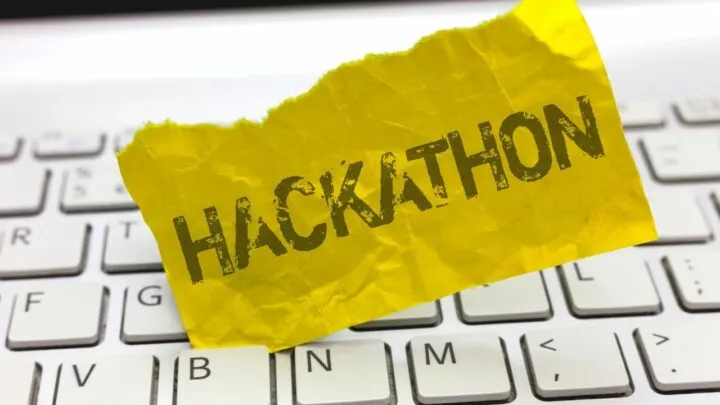Hackathons are collaborative timed projects which explore software and app development under specific topics or themes, such as using a certain OS or programming language.
Hackathons are intensive and require the ability to work under pressure, as well as fundamental skills in programming. How can you best include hackathon experience on a resume?
How to Include Hackathon on a Resume
A hackathon is typically included in the skills section. Include it as a bullet point under a programming header such as “programming” or “C++” depending on the hackathon’s content. You may also include it in the relevant experience section if you have more than one experience to describe.
Hackathon – A dangerous word on a resume
The first thing to consider when including hackathon experience on a resume is how that word may come off to an employer. To someone who has never heard of this event, it may sound negative or suspicious.
Hacking is historically a malicious way to utilize programming or computer experience, thus reading this term on a resume may give an employer pause when considering a new employee.
Hacking is most often illegal, so those who are unaware of the purpose of a hackathon could grow wary.
Making hackathon a positive on a resume
While words which sound like “hacking” may sound negative to an employer, this does not mean you should omit hackathon experience on a resume.
Choosing your words carefully is an important part of including this experience, so let’s discuss ways we can do so.
The best and simplest way of framing this experience is to add a small description beneath it stating what a hackathon is.
This must be kept brief, as it is wrong to go over two pages on a resume.
Especially in the skills section which rarely uses bullet points, the more concise you make this description the better.
You may also include it after the description in the relevant experience section. This way the employer knows what it is before they even come to the word “hackathon”.
The experience of working in a group under pressure is a great asset, so let’s go over some examples of how the formatting will look on a resume.

How to include hackathon in the skills section
Begin the relevant skill with a title such as “Java” or “C++”. Beneath the title, include a single bullet point which states your hackathon experience and what it was focused on.
You should not over-explain the project because the focus should be on the base skill and not the weekend experience.
When titling this skill, decide what you want the employer to get out of your resume.
For more general programming experience, you can title this “Computer programming”.
For a specific type of programming, you can narrow this down to “C++” or “Phone app development”.
If you have participated in multiple hackathons, choose the most relevant one or include this in the experience section instead.
The skills section should remain concise and easily read, as it is not meant to be written in paragraph or full-sentence format.
Hackathon does not need to be capitalized mid-sentence, as there are many different hackathons all over the US with different affiliations.
The word refers to the type of event, not a specific event, thus it is not a proper noun.
When formatted correctly, hackathon experience in the skills section should look as follows:
Skills
- Website security
- Typing speed of 80 WPM
- Computer programming
-
- Participated in hackathon, a 48-hour group programming collaboration focused on website design.
How to include hackathon in the relevant experience section
Hackathon should be described using full sentences without pronouns in this section.
Describe what the event is, what the focus was, and what skills were necessary to achieve the desired outcomes. Do not use more than 2-3 sentences, as this is a short-term event which should not be a focal point.
The relevant experience section is different from the work experience section. Relevant experience may include experiences such as volunteering, short-term experiences, one-month jobs, or temporary jobs.
A weekend event is fitting in this area, but not in the work experience section.
Employers want to see longer-term work experiences, so it is unwise to include a two-day event in the same section as other jobs. Be sure to separate these sections by using the header “Relevant Experience”.
You may choose to include bullet points in this section in the same way you would with jobs. This section should be briefer than the work experience section, however, so only use a maximum of 1-2 bullet points to explain the experience.
When formatted correctly, this will look as follows:
Relevant Experience
Computer Programming – Hackathon 2020
- Participated in a 48-hour collaborative programming project with a team of 20 people
- Developed a mobile app focused on health and fitness tracking
We know how to include hackathon experience on a resume, but there is the question of whether this experience deserves to be included.
Because of limited space, resumes should only display the best and most impressive jobs or experiences in order to make the employee stand out among the rest.
Does hackathon experience make the cut?
Should you include hackathon experience on a resume?
Hackathon experience can be included to fill blank space or if the results were particularly impressive. However, a weekend-long experience has lower value to an employer than a long-term one. Do not include hackathon experience if you have other relevant experiences you can put instead.
On a resume, the more concise a skill is, the more it will stand out to an employer. Including the bullet point “7 years of experience in C++” may be more impressive than describing a hackathon you participated in which was focused on C++, because it draws attention away from the base experience of seven years.
For those who are new to the skill or have nothing to put on their resumes, hackathon experience is a nice boost to their credibility in the area.
For those who already have several years of experience, including hackathon experience may make one come off as a novice.
Experts do not need to bolster their skills describing short-term projects on their resumes because their work experience speaks for their utility in the workplace.
In those instances, it is best not to include hackathon experience.
Hackathon experience can always be brought up during interviews, where you may describe your ability to program under pressure and collaborate with others.
This is a great response to the typical interview question “describe a time you overcame a great challenge” or other similar inquiries.

Hey fellow Linguaholics! It’s me, Marcel. I am the proud owner of linguaholic.com. Languages have always been my passion and I have studied Linguistics, Computational Linguistics and Sinology at the University of Zurich. It is my utmost pleasure to share with all of you guys what I know about languages and linguistics in general.

